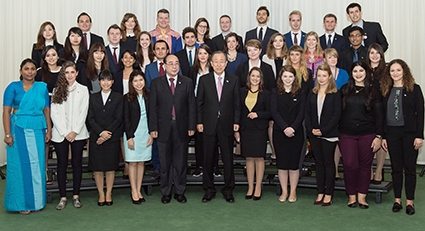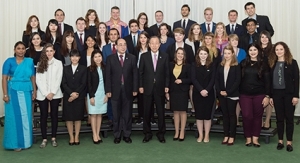Thoughts on Representing Georgian Youth to the United Nations
In real life, the United Nations headquarters in New-York is more magnificent than in any photograph I have ever seen. The 39-floor massive construction completed in 1952 in the Turtle Bay neighborhood of Manhattan mesmerized and filled me with eclectic feelings of triviality mixed with pride and a sense of importance to be able to have a say at the UN General Assembly, as a Georgian UN Youth Delegate at the age of 24: I don’t intend to brag, rather, I was frightened and overwhelmed with the opportunity.
This October, around 35 Youth Delegates from around the world arrived in New-York with a primary mission to deliver official statements to the Third Committee of the UN General Assembly at its 70th session on behalf of youth from their home countries. Apart from delivering statements, there were meetings scheduled with the United Nations Secretary-General, Ban Ki-Moon, and the Secretary-General’s Envoy on Youth, Ahmad Alhendawi, as well as a number of high-level side-events on the agenda. Everyone tried to appear composed, but in fact all of us felt nervous with what was happening.
As expected, the issues raised by the young delegates in their statements varied depending on the country of origin: unlike Georgia, for instance, the representatives of Belgium, Germany and Switzerland didn’t touch upon questions regarding territorial integrity or foreign occupation, but talked about scholarship opportunities for higher education, gender equality, global perspectives on the refugee crisis and more. During the allocated time for the speech, I presented a number of challenges faced by Georgian youth, including national security and necessity to protect the rights of Internally Displaced Persons. It is impossible to neglect the fact that among 400,000 internally displaced people in Georgia, youth among them are especially vulnerable, with some being prevented from exercising their right to education in their own native language, which is guaranteed by the UN Convention on Rights of a Child. The importance of social integration of persons with disabilities, as well as support of youth who have left foster care were also among the priority areas.
“…Sometimes statements of regret and condemnation are not enough. We, the youth of Georgia, need international support in the face of foreign military occupation, because these are not merely violent actions against one specific country, but rather deliberate efforts to undermine the universal principles of sovereignty and territorial integrity. I would like to welcome and commend the commitment of all young people to cooperate for the attaining of sustainable peace and development. Our young people are not only the future, but also the present and we stand ready to engage in every initiative and action aimed at implementation of post-2015 Development Agenda, especially in the context of promotion and empowerment of youth around the globe.”
Our meeting with the UN Secretary-General, Ban Ki-Moon was motivating and inspiring: “Never be afraid to aim high,” he told us. The Secretary-General strongly encouraged advocating for investing in youth empowerment to achieve sustainable future development. He sincerely believed in the boundless capacities of the upcoming generation, seeing young people as key partners and main agents for change. Ban Ki-Moon has made working with and for young people one of his top priorities in his five-year Action Agenda adopted in 2012 and was the first Secretary General to appoint an Envoy on Youth, the position assumed by a young activist from Jordan, Ahmad Alhendawi, back in 2013.
Ahmad, a vigorous young man fully committed to youth development across the globe, shared with us some of his upcoming plans for creating global youth platforms for enhanced advocacy efforts and discussed the opportunities and barriers precluding full realization of youth potential:
“Almost half the world’s population is now under the age of 25 and, despite this, young people are often disengaged from the world’s political processes, face unemployment and are treated as mere beneficiaries of charity by the older establishment. But this is changing and they are going to be partners in implementation of SDGs and they will also hold governments accountable to the promises they make.”
In partnership with Bulgarian and Dutch Youth Delegates, I also organized a side event in the UN Headquarters on “The Role of Youth in Sustainable Peace and Security,” inviting guest speakers from academia, UN and the United Network of Young Peacebuilders. At the end of the meeting, all the participants came to a common conclusion that the best outcomes are reached when an authentic youth-adult partnership is established, because any subtle change is delusional unless young and elders equally participate in the processes which determine their future.
Along with its perks, being a Georgian UN Youth Delegate is a mandate full of responsibilities – a one-year position which is open to all young citizens of Georgia every year. The program is fully funded by the Ministry of Sport and Youth Affairs in partnership with the Ministry of Foreign Affairs of Georgia. The visit to the UN headquarters in New-York left me with lifetime impressions and I wish all young people within and outside of my country to never step back from trying to realize their sincere goals which aim to make our world a better place.
Mariam Sikharulidze












